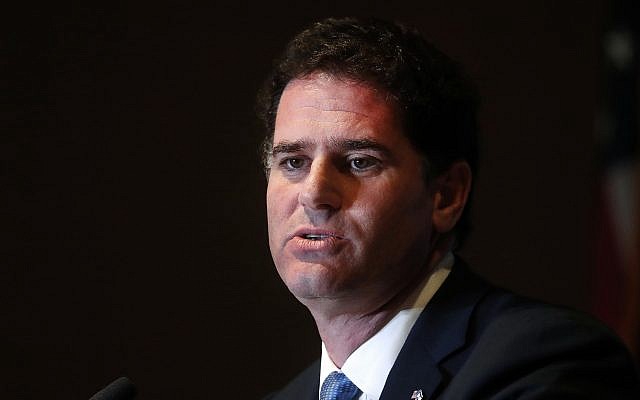Envoy to US: Annexation will help Ramallah abandon ‘illusions,’ accept 2 states
2020-07-02
Originally Published at: The Times of Israel / Staff
Ron Dermer, in op-ed for Washington Post, says world has helped foster false Palestinian hopes of ending Israeli state, asserts Jerusalem’s plan will help them accept reality
Israel’s plan to annex large swaths of the West Bank will help, not hurt, the prospects of peace with the Palestinians, by convincing them to abandon their “illusion” of ending the Jewish state project and agree to a true two-state solution, Israel’s Ambassador to the US said in an op-ed published Saturday.
Ron Dermer argued, in his opinion piece (paywall) for The Washington Post, that the international community’s policies have inadvertently helped the Palestinians foster false hopes of one day overthrowing the Jewish state.

“The extension of Israeli sovereignty to certain territories in Judea and Samaria will not, as many critics suggest, destroy the two-state solution. But it will shatter the two-state illusion. And in doing so, it will open the door to a realistic two-state solution and get the peace process out of the cul-de-sac it has been stuck in for two decades,” Dermer wrote.
He added, “Palestinian leaders have rejected every Israeli peace overture while systematically promoting a culture that rejects peace and glorifies terrorism, including by providing a lifetime of financial support for terrorists who murder Jews.”
The conflict “has never been about establishing a Palestinian state. It has always been about rejecting the Jewish state,” he argued.
And international leaders, by ignoring “the root cause of the conflict” and “doubling down on a failed strategy,” have continuously moved the goalposts closer to the Palestinian position in an attempt to bring them to agree to a resolution, he asserted.
The result, he said, was a “two-state illusion” that has “proved disastrous for peace,” maintaining Palestinian refusal to generous offers from Israel over the years while losing the Israeli public as each overture was met with more and more terrorism.
The Trump peace plan, Dermer argued, offered a true course to peace by demanding Palestinian recognition of Israel’s legitimacy and addressing its security concerns, while seeking realistic solutions to the situation on the ground.
Israel’s annexation plan, he stated, will relate only to “territories that will remain part of Israel in any realistic peace agreement.” This, Israel hopes, “will convince the Palestinians that another century of rejectionism is a losing strategy and that the Jewish state is here to stay.”
Earlier this week coalition whip Miki Zohar said Prime Minister Benjamin Netanyahu had promised his Likud faction that no government he leads will ever recognize a Palestinian state, even in principle.
“The prime minister announced yesterday at the faction meeting that in no constellation will the government or the Knesset recognize the principle of establishing a Palestinian state,” Zohar tweeted.

Some settler leaders have also heavily criticized Netanyahu’s push for annexation, saying it will pave the way, under the Trump plan, for a Palestinian state.
Under a coalition deal between Netanyahu and Blue and White leader Benny Gantz, signed last month, the government can pursue annexation of all the settlements and the Jordan Valley — the 30 percent of the West Bank allocated to Israel under the Trump administration peace plan — from July 1.
The Palestinians have rejected the US plan, and earlier this month said they had submitted a counter-proposal for a demilitarized Palestinian state to the Middle East peacemaking Quartet — the US, EU, UN and Russia.
The Trump administration has indicated it will not oppose Netanyahu’s declared plans to do so, but has lately signaled ambivalence about the timing of such a move. And according to recent Hebrew media reports, the US administration wants Gantz to be on board with any annexation move.
While Gantz and Foreign Minister Gabi Ashkenazi, a member of Blue and White, have backed Trump’s peace plan, they have signaled opposition to annexing lands unilaterally and endangering the peace deal with Jordan.
Jordan’s King Abdullah deemed unilateral annexation “unacceptable” in briefings this week to American lawmakers, and is expected to withdraw his ambassador, downgrade ties with Israel and reconsider the 1994 Israel-Jordan peace treaty if Netanyahu goes ahead. Abdullah also said he was trying to persuade Palestinian Authority President Mahmoud Abbas to enter negotiations with Israel, however, and Jordan’s foreign minister this week reportedly told Abbas in Ramallah to telephone US President Donald Trump to explain his opposition to unilateral Israeli annexation.
Channel 13 reported Friday that Netanyahu and Gantz held further talks on annexation, but did not make any progress toward reaching an agreement. The two have met several times in recent days to discuss the matter, including for talks attended by US Ambassador to Israel David Friedman.
According to a Channel 12 report Friday, Netanyahu has drawn up four scenarios for annexation in which Israel would extend territory over most of the settlements and a total of anywhere from 12% to 30% of the West Bank.
The issue has also threatened to upend years of diplomatic work forging quiet ties between Israel and Gulf states. Last Friday, the United Arab Emirates’ influential ambassador to the US, Yousef al-Otaiba, warned in a Hebrew op-ed published in an Israeli paper that Abu Dhabi would freeze normalization if annexation moves ahead.